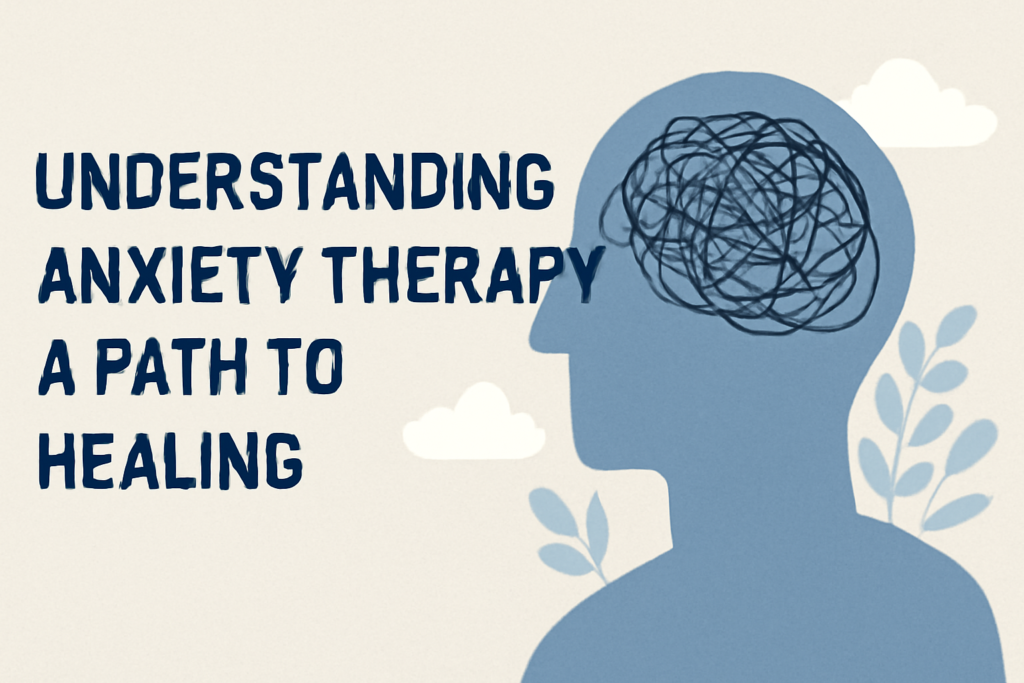Anxiety is a common mental health issue that affects millions of people worldwide. From mild nervousness to debilitating panic attacks, anxiety can interfere with daily life, causing stress, fear, and uncertainty. Fortunately, anxiety therapy offers individuals a structured approach to managing and reducing anxiety symptoms.
In this article, we will explore what anxiety therapy is, its different types, and how it can help those struggling with anxiety.
What Is Anxiety Therapy?
Anxiety therapy refers to a range of therapeutic methods designed to help individuals manage and reduce anxiety symptoms. The goal is not only to alleviate the immediate feelings of anxiety but also to address its root causes and teach long-term coping strategies. Therapy can help individuals recognize negative thought patterns, control their physical reactions to anxiety, and develop a healthier mindset overall.
Types of Anxiety Therapy
There are several effective therapeutic approaches used to treat anxiety. The right type of therapy depends on the individual’s unique symptoms and circumstances. Here are some of the most common types of anxiety therapy
-
Cognitive Behavioral Therapy (CBT)
CBT is one of the most widely used and research-supported therapies for anxiety. It focuses on identifying and changing negative thinking patterns and behaviors that contribute to anxiety. By learning to reframe anxious thoughts, individuals can reduce their anxiety and improve their responses to stressful situations. -
Exposure Therapy
This form of therapy is particularly helpful for individuals with specific phobias or social anxiety. Exposure therapy involves gradually and safely exposing individuals to situations or objects that trigger anxiety. The goal is to reduce the emotional response over time through repeated exposure in a controlled environment. -
Mindfulness and Relaxation Techniques
Mindfulness techniques help individuals stay present and grounded in the moment, reducing the tendency to overthink or worry about future events. Practices such as deep breathing, meditation, and progressive muscle relaxation can help calm the body’s physical responses to anxiety and improve emotional regulation. -
Psychodynamic Therapy
This approach focuses on exploring the unconscious mind to identify unresolved issues or past experiences that may contribute to anxiety. By gaining insight into these underlying factors, individuals can better understand and address the root causes of their anxiety. -
Interpersonal Therapy (IPT)
IPT focuses on improving interpersonal relationships and communication skills. Anxiety often arises or worsens due to difficult social interactions or strained relationships. By improving these areas, individuals can reduce social anxiety and feel more confident in their relationships.
How Anxiety Therapy Works
The process of anxiety therapy varies based on the type of therapy being used and the individual’s specific needs. However, there are a few common components in most therapy sessions:
-
Assessment: The therapist will begin by assessing the individual’s anxiety symptoms, triggers, and overall emotional well-being. This assessment helps to develop a personalized treatment plan.
-
Skill-Building: Anxiety therapy often involves teaching individuals practical tools to manage their anxiety. This may include strategies like deep breathing, thought-stopping techniques, or cognitive restructuring.
-
Ongoing Support: Regular therapy sessions provide individuals with a safe space to discuss their progress, challenges, and any new concerns. The therapist offers ongoing support and adjustments to the treatment plan as needed.
-
Long-Term Benefits: While anxiety therapy can provide immediate relief, its true benefit lies in long-term management. Individuals who undergo therapy learn coping mechanisms and skills that help them navigate life’s challenges without being overwhelmed by anxiety.
When to Seek Anxiety Therapy
Anxiety therapy can be helpful for anyone experiencing anxiety that affects their day-to-day life. However, certain signs may indicate that professional therapy is needed:
-
Constant Worry: When anxiety begins to interfere with everyday tasks, work, or social interactions, therapy can provide relief and structure.
-
Physical Symptoms: Anxiety often manifests in physical symptoms such as headaches, stomach issues, or sleep disturbances. Therapy can help reduce these symptoms by addressing the underlying causes.
-
Panic Attacks: If you experience sudden and intense bouts of fear or panic, anxiety therapy can help you understand and manage the triggers of these attacks.
-
Avoidance Behavior: If you find yourself avoiding certain places, people, or situations because of anxiety, therapy can help you gradually face and manage these fears.
The Benefits of Anxiety Therapy
Engaging in anxiety therapy can lead to significant improvements in mental and emotional well-being. Here are a few potential benefits:
-
Reduced Anxiety: Through consistent therapy, individuals can experience a reduction in the intensity and frequency of anxiety symptoms.
-
Improved Coping Strategies: Therapy equips individuals with tools and techniques to handle anxiety-provoking situations more effectively.
-
Better Emotional Regulation: Learning how to manage anxious feelings can lead to a more balanced emotional life and a greater sense of peace.
-
Enhanced Relationships: Anxiety often strains personal and professional relationships. By addressing anxiety through therapy, individuals can improve their communication and social interactions.
-
Increased Confidence: As individuals gain control over their anxiety, they often feel more confident in their ability to handle challenges in their personal and professional lives.
Conclusion
Anxiety is a complex and often overwhelming condition, but it is treatable. Anxiety therapy offers individuals the opportunity to better understand their anxiety, reduce its impact on daily life, and develop healthier coping mechanisms. If you or someone you know is struggling with anxiety, seeking therapy can be a valuable first step toward healing and reclaiming emotional well-being.
KS Therapy Services offers a range of therapeutic options to help you manage anxiety and build a stronger, more resilient mindset. Reach out today to start your journey toward healing.
Also Read: Your Guide to St Lucia Airport Transfers with Golden Ticket SLU



